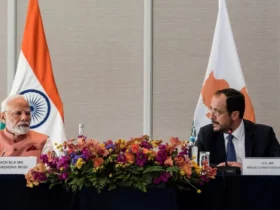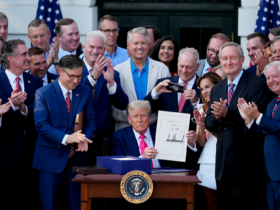Interview by Ana Dagorret
The global capitalist economy seems in disarray. From increasing inflation to vulnerable supply chains, from endangered food production to energy transition and crisis – complaints and warning calls rise at nearly every chapter and branch of the world economy.
United World International thus has started a new series of articles and interviews that will shed light on the situation of the global economy from the perspective of different national economies.
Above all stands the question, whether the world is heading towards a new global great depression, as witnessed in 1929.
Argentina meanwhile is one of the contries that regularly dominate headlines when it comes to economic crises.
About the current situation of the Argentine economy, we spoke with Horacio Rovelli. Rovelli is Professor in the University of Buenos Aires, Argentina – specifically, in the Political Economy department of the faculty of Social Sciences and Monetaryy Institutions and Regional Financial Integration department of the faculty for Economic Sciences. He is also member of the Economy Commission in the State, Work and Production Foundation (FETyP). Formerly, Rovelli was National Director for Macroeconomic Planning in the Minsitry for Economy and Finances.
How do you currently evaluate your country’s economy?
The Argentine economy is an extractive agricultural and livestock exporting economy, which gives an extraordinary benefit to the extraction of minerals, such as metals like gold, copper, iron, silver; as well as hydrocarbons: oil, gas. And also, of course, agricultural production. We have a vast humid pampa, record of record, more than 140 million tons of grain production per year, including soybean, corn, wheat, sunflower, oats, barley. But mainly soybean, corn, wheat and sunflower.
Argentina is a country with 47 million inhabitants and it is applying a fiscal and trade adjustment model on the one hand, to have higher exportable balances – and so that the population consumes less – and also to import less energy, because in winter we are not self-sufficient in gas or diesel oil.
Obviously this benefits a handful of companies. It is very strongly concentrated. Let us think that 200 companies represent more than 80% of Argentina’s exports. Our country exports almost 80 billion dollars of goods per year.
So, it is a completely unequal country. An economy integrated to that of foreign countries, with big foreign companies. In the grain sector, we have ADM, Bunge, Cargill, Louis Dreyfus, Glencore, Cofco. There are also some national companies such as Aceitera General Deheza, ACA which is an association of Argentinean cooperatives, Molinos Agro, which is Perez Companc’s grain exporter, and big hydrocarbon companies. YPF, which is 51% state-owned but 49% private. BlackRock, whose CEO is Larry Fink, acknowledges that it has 6.06% of YPF. And then there are the foreign companies: Total Austral, the American multinational Apache and Chevron, Pluspetrol, Petrobras; Panamarican Energy, which joined Bulgheroni -Bridas, a local group- with British Petroleum, an English company that exploits our oil and gas in our Falkland Islands authorized by the British government.
“Argentina is a very unequal country”
Argentina is a very unequal country. It has a strong trade surplus but at the same time, it uses a large part of it to pay supposed foreign debt. Here there was a brutal capital flight during the previous government -of Cambiemos, headed by Mauricio Macri-.
One hundred companies bought 24,769 million of US dollars and none of them can prove in their financial statements where they got the resources to buy that amount of dollars.
24,769 million dollars in four years.
Highly concentrated and with alarming levels of poverty: more than 40% of the Argentine population, especially the elderly and children, are below the poverty line.
We have also high indigence and unemployment rates. A highly dollarized economy and the worst is yet to come, because we are now without debt capital maturities. A very complex situation.
“No confidence in Argentine currency”
Do you observe signs of an economic crisis in your country? If so, based on what indicators?
Of course there are clear signs of crisis in our country. One clear sign is that there is no confidence in the Argentine currency. The currency is used as a mere exchange instrument. The reserve currency is the US dollar. An economy that is strongly dollarized. Major assets are bought and sold in dollars. And an economy that has a significant percentage of debt, a debt that exceeds almost 90% of GDP and exceeds three and a half times exports by far.
Yes, it is an economy that has evident signs of crisis because it does not have an integrated structure and the minority that gets rich is closely linked to foreign countries. They are foreign companies.
According to the national survey of large companies carried out by INDEC, the National Institute of Statistics and Census, 335 out of the first 500 companies are foreign.
This is a very difficult situation and, although it is true that due to the pandemic, the rise in food prices, especially grains such as corn and soybean, has benefited this sector which collects and sells grains and meat, it is very unequal with respect to the rest of the country which suffers from these higher prices.
Regarding the causes of the economic crisis: Which are the domestic and which are the international factors that you consider important? How do you see the relationship between them?
The economic crisis can be explained, because we do not have a model for the whole country. It is an excluding, extractivist, agricultural and exporting model that benefits a minority.
The hard core goes to 1% or 2% of the population, then they have those who supply them or work for them.
For example, the automotive factory of 4×4 pickup trucks that sell to the most concentrated sectors, do not supply and take three or four months to deliver the orders they have. The same applies to agricultural machinery.
There are sectors that are dynamic and function by integrating with those which, in turn, integrate the rest of the world.
But the domestic effect is that there is no domestic demand, and Argentina can only grow in a sustainable way if it has a strong domestic demand.
The goose that lays Argentina’s golden eggs is not the countryside, as the Minister of Agriculture, Livestock and Fisheries says. No, the goose that lays the golden eggs is domestic consumption.
Practically 70% of what is produced in the country goes to the domestic market and that domestic market is very depressed. So, the fundamental domestic factor is economic inequality and a very depressed domestic market. That is the cause of the internal factor of the crisis.
Now, the external factor is the debt. Coincidentally, these sectors that took advantage of the Argentine indebtedness to flee capital, left the State indebted, they are not responsible for anything and the foreign debt is a very important conditioning factor.
The International Monetary Fund, which co-governs Argentina, imposes very strong goals for increasing international reserves, monetary emission: this year only 1% of the gross product can be issued to finance the State; and also the fiscal deficit must be 2.5% of the gross product.
These are all very strong data that condition the Argentine economy.
Then you have a depressed domestic market due to the fall in consumption and domestic aggregate demand, and the conditioning factor of the external factor that demands peremptorily goals that cannot be met in order to be able to face the external commitments which, although we are now paying the interests and only from the second semester of 2024 the capitals will start to be paid, already leaves us in a meager situation to be able to face only the interests of the debt.
The world is heading to “vegetative growth”
How do you see the future of the global economy?
The future of the global economy is in the hands of the most developed countries and these, in turn, depend on international financial capital. They are going to continue with this permanent increase in US interest rates, the relationship between the US and the rest of the currencies; this soft landing of the US trade deficit.
The world itself is going to a vegetative growth, a growth that is not going to exceed the growth of the population and also in an unequal way as all the financial capital that favors and prioritizes financial income to the detriment of production. This has been happening, is happening and will continue to happen.
How did we, a peripheral country, get involved in this model? And well, also in the same way, doing exactly the same thing: benefiting financial, agricultural and mining income, to the detriment of production.
The only thing they are interested in selling abroad is our comparative advantage of what we have in the earth and under the earth, and that does not generate much work. How much labor is involved in exporting a ton of soybean or a kilogram of gold?
What is your solution to the aforementioned crisis?
The solution and it has been demonstrated by the Argentine governments to exhaustion, the first two governments of Peronism, the government of Dr. Arturo Illía between 63 and 66 that overthrew him. The third government of Perón, while he was alive, Gelbard was Minister of Economy; and the Kirchner administration, especially Néstor Kirchner.
Argentina grows if its domestic market grows. If money is put in people’s pockets, as Néstor Kirchner used to say, Argentina grows like mushrooms in the rain because, I repeat, 70% of what we produce is produced by the domestic market.
Today salaries are terribly depressed, the average salary in Argentina in 2015 was $1700 dollars, or $15,600 -the dollar was $9.10-.
In May 2022, because we still do not have the June data, according to the Bulletin of Labor Studies (BEL) of the Ministry of Labor, Employment and Social Security of the Nation, the average salary is $112,000, the dollar closed in May -now it grew- $125. This is not even $950.
1700 dollars average salary in December 2015, and in May 2022 we do not reach 950 dollars.

















Leave a Reply